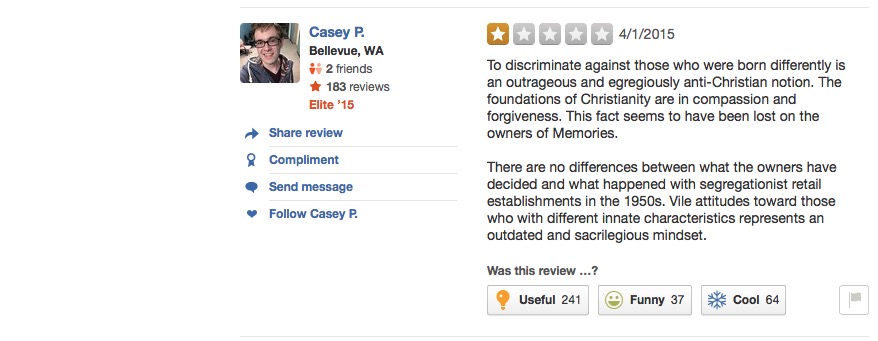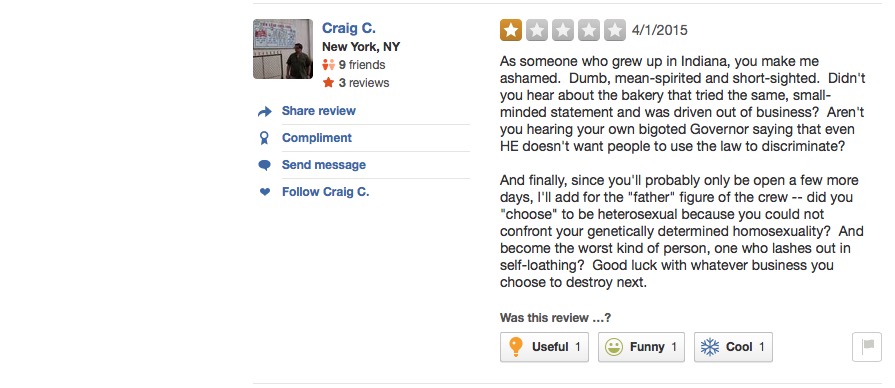After the owner of a pizzeria said last week that he wouldn’t cater a gay wedding, a group of Yelpers took action, using their reviews to bring down the business. Not customers unhappy with the service, but social justice protesters reviewing the business based on ideology. And it’s not just an isolated case.
With the passing of Indiana’s Religious Freedom Restoration Act last week, any potentially discriminatory business became a target for civil rights groups. Memories Pizza was forced to close its doors, mostly because of the public demonstrations that swamped the storefront. But it was the Yelpers who managed to swiftly and completely damage the business’ online presence, netting national media attention.
First, the photos on the business’s Yelp page took on a surprising change in content:

And then the reviews, well, let’s just say they weren’t really about the pizza anymore.


Within days, Memories Pizza had 93 reviews, almost all filed as part of the ideological battle.
(Reports that Memories Pizza’s site had been hacked was actually a hoax: memoriespizza.com was registered as a fake site and another URL, memoriespizza.org, now directs to a crowdfunding campaign to “relieve the financial loss endured by the proprietors’ stand for faith.”)
Of course, people have been gaming Yelp for ages — customers ganging up on restaurants after shoddy service, business owners using Yelp to lash back at their negative reviewers, or getting their friends to post fake good reviews.
But these social justice reviewers are people who have never patronised the businesses, don’t even live nearby, and clearly don’t care about the review site’s community. These are Yelp vigilantes.
This has become a common enough occurrence that Yelp now has a special team that looks at review content after businesses are featured in high-profile media stories like this.
“[Yelp] will remove content that violates our Terms of Service, including reviews that only attack a business’ political ideologies,” Yelp’s Hannah Cheesman told me. In fact, one of Yelp’s Content Guidelines specifically addresses relevance: “Yelp reviews are required to describe a firsthand consumer experience, not what someone read in the news.”
Take the Days Inn minimum wage case for instance. Just hours after the Washington Post reported on March 30 that an employee of a Days Inn in Arkansas was fired for talking to its reporter about her minimum wage salary, the inn’s Yelp page lit up with a dozen one-star reviews referencing the incident.
All reviews have since been removed except for one, which seems like it was written in response to the incident but only obliquely references it: “Awful people who think it’s OK to underpay employees and then fire them when they express their opinions to national news outlets,” wrote reviewer Thomas A. “Do not give these people your money under any circumstances.”
Yelp protests can be especially destructive. Like many small businesses, Memories Pizza didn’t even have a website. Their Facebook page links to their Yelp page (still does, as a matter of fact). Even if a business has a website, the Yelp link is often listed higher in search rankings, and is the default link for some apps like Apple Maps.
But that’s also why attacking a Yelp page can be far more effective than attempting to hack a website. Instead of a single hacker working alone, it opens the door to a collaborative internet pile-on. Unlike a Facebook page for a business, where the comments can be moderated by the owner, Yelp’s reviews must be flagged and removed by their team one by one. Plus, the starred reviews bring down their overall rankings, even temporarily. It also provides the most direct, targeted feedback to a business owner — Yelpers know the owners are reading the reviews.
It makes me wonder what could happen with a little organisation behind the scenes. How long until an Anonymous-like group starts to orchestrate large-scale Yelp takedowns of chains? One could see a targeted attack on Chick-fil-A franchises all over the country due to their anti-gay sentiments. Or a women’s health tirade on Hobby Lobby locations. The Yelp vigilantism might only be temporary, but it can really hit businesses where it hurts.
Picture: AP
